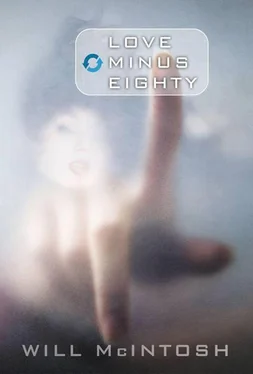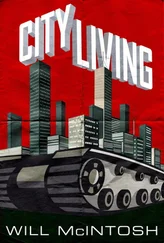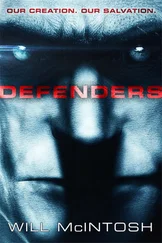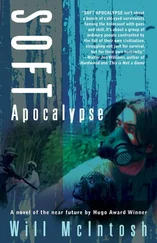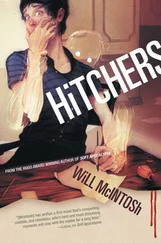“It’s so easy to talk to you,” Lycan was saying. “Out in the world, I’m so uncomfortable around women. My heart races. But I open up with you. If you weren’t in that drawer, you probably wouldn’t give me a second glance, though.”
Mira could see he was fishing, that he wanted her to say he was wrong, that she would give him a second glance. It was difficult—it wasn’t in her nature to pretend that she felt something she didn’t. But she didn’t have the luxury of honoring her nature.
“Of course I would. You’re a wonderful man, and good-looking.”
Lycan beamed. “Some people just spark something in you, make you breathe faster, you know? Others don’t. It’s hard to say why, but in those first seconds of seeing someone”—he snapped his fingers—“you can always tell.” He held her gaze for a moment, something that was clearly uncomfortable for him, then looked at his lap, blushing.
“I know what you mean,” Mira said. She tried to smile warmly, knowingly. It made her feel like shit.
There was a constant murmur of background chatter this time.
“…through life and revival, to have and to hold…”
“What is that I’m hearing? Is that a marriage ceremony?” Mira asked.
Lycan glanced over his shoulder, nodded. “They happen all the time here. It’s kind of risky to revive someone otherwise.”
“Of course,” Mira said. She’d been here for decades, yet she knew nothing about this place.
Vince met him outside the front gate of the reclamation center. “Nifty?”
“Not even close,” Rob said, falling into step beside Vince. His back still ached from the previous day, and he felt unnaturally drowsy, like he’d been drugged or was getting sick. Vince didn’t look tired, though he’d been working at the reclamation center since he finished his last year of free education at sixteen. “Do you adjust to this after a while? I’m so tired I can barely keep my eyes open.”
Vince shrugged. “I wouldn’t say you adjust. You just get used to being tired.”
Ramapo Mountain loomed beyond the reclamation center. It was conically shaped, if you discounted the huge bite taken from the left side. Vince had said they’d have the whole thing processed in another ten years, and move on to another site. Maybe that was why the building looked temporary, constructed of a molded quilt of plastics and metals they were reclaiming from the mountain, the ceiling barely a foot above Rob’s head.
In the staging room Rob stashed his clothes in a locker, pulled on a hazard skin, and fixed the filter over his mouth and nose. Then it was out to his station on the floor, past the drones doing the heavy work, tearing open plastic shells and steel cases to expose corroded batteries, circuits, magnets, all the tasty morsels Rob and his superior human fine motor skills would remove and sort. Not that there weren’t drones that could do what he did, but they were so expensive to purchase and operate that it was cheaper to pay Rob.
The chubby, ruddy-cheeked woman who’d worked the night shift nodded to Rob as he took over her spot and got to work. The hazard skin’s built-in system color-coded the various crap, so all he had to do was use the suit’s various extensions to extract the stuff and drop it into the correct color-coded mobile bins. The tough part was that his employers demanded speed. So far he’d been docked at least ten percent of each day’s pay for insufficient pace. Vince said that was common for beginners.
The torn-open thing he was working on was big and round and unidentifiable. Rob’s best guess was that it was a solar cell, but it didn’t matter. Pluck out the components glowing red, drop them in one bin, the green components in another, and so on. The mindlessness of the work allowed him plenty of opportunity to think. Much of the time he rehearsed what he was going to say to Winter. He’d tried out so many possibilities that the words were beginning to lose meaning, to decompose into word salad.
The important thing was, he had saved three thousand dollars. His father was letting him defer the seven thousand Rob owed for the first visit, and was footing the bill for the interest out of his own earnings. His father was a saint. No grown man nine years out of school could reasonably expect the sort of help his father was giving him. One day, Rob would make it up to him. He would never forget.
At lunchtime Veronika pulled the cook cord on her Thai boxed meal. When it finished heating, she popped over to Bourbon Street in New Orleans and people-watched. She needed to be around people while she ate, otherwise she would wallow in self-pity that she was eating alone, and she would get depressed. Watching others have fun on Bourbon Street didn’t completely insulate her from the tightness in her chest that always came with eating alone, but it helped. After three hours on the bridge, she was seeing the downside: people came and went, but they passed quickly and anonymously, hunched against the cold. Vehicles whizzed by, their drivers paying no attention to Veronika. She was basically all alone.
A climate-controlled full body suit kept her body warm, but her face was icy cold, and the wind was constant and made it difficult to work. Still, the view was lovely. The choppy black water far below; the river, glimpsed here and there winding among old brick-and-steel toward the horizon; one massive pillar of High Town so close it seemed she could reach out and touch it; the strings of apartments hanging like jewels from the underside of High Town, swaying slightly in the stiff March breeze. Beautiful.
It had been the right decision to come here, despite the isolation. She felt alive, and vigorous. She’d come back tomorrow, and the day after, leaving only to hang out with Nathan for their afternoon coffee.
Her social life revolved so heavily around Nathan. Why did she have so few friends? It was a question she obsessed over, but there on the bridge, with the water lapping far below, she felt an uncommon clarity. It wasn’t because she was abrasive, or because she was an outsider. She used to have friends, other outsiders who hung out at coffee shops until late into the night, trading witty barbs. Without realizing it she’d shed some of those friends when she met Sander, even more when Sander left her for Jilly. The truth was, she hadn’t tried to make friends since Sander left her for her sister. She hung out with Nathan, played with her interactives, worked. She was alone because she’d chosen to be alone.
A pedestrian stopped at the apex of the bridge, enjoyed the view for a moment, then continued across. Veronika was ready, though. Eventually someone would come to jump, and she would be there, a light against the darkness of their despair. Maybe she wouldn’t be able to convince all of them, but if three people jumped per week on average and she could stop one, she’d be saving a life a week.
When the worst of the disorientation cleared, Winter smiled. “I thought I’d totally blown it with you, and here you’re back. You must like your women anxious and needy.”
Rob tried to laugh, but only managed something that sounded more like a dry cough. He was so nervous, the muscles in his face felt tight, and his lip was twitching.
“I wish I was here for a date. I really do.” His voice was a harsh whisper.
Winter studied his face, her smile fading. “What do you mean?”
Rob stared at the floor, trying to muster his courage. He couldn’t blow it this time. He’d worked his fingers to the bone, double shifts for three months, for this opportunity. He had to tell her, right now.
“I’m here to talk to you about your accident. That’s why I came the first time, but time got away from me. I lost my nerve, I guess.”
Читать дальше
